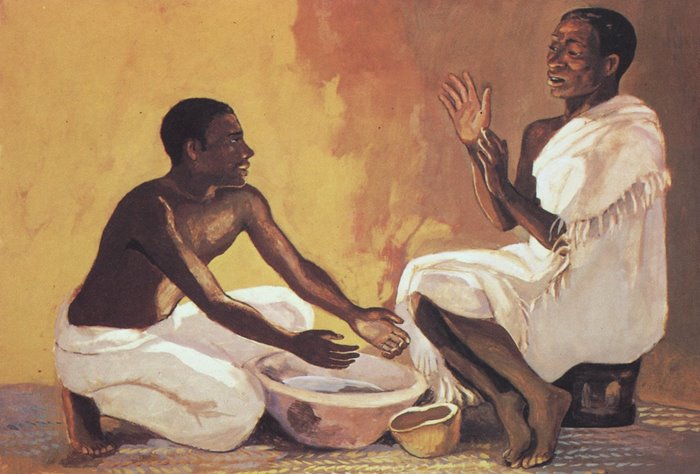Wash Feet and Feast Together to Remember Jesus
18 April 2019 – Maundy Thursday
Holy Week is not a time for a deep theological discussion, nor a historical exploration of what may have happened. It is a time for images, poetry, story. Thursday evening foot-washing [with] holy communion . . . center around actions and may include more scripture than usual. It is a time for shorter meditations, perhaps tied together by an image. –– Hilda A. Parks
John 13: 1–17, 31b–35
During this supper, Jesus enacts a parable by offering to wash the feet of the disciples. The Son who is about to meet the Father in glory casts himself in the role of a servant, and washes the feet of the guests at a dinner table just as any lowly house slave would have done in the ancient world. . . Jesus not only enacts the parable of the foot-washing, but interprets it for his disciples as well, which is a consistent trait in John’s gospel: a sign is performed, the disciples misunderstand or fail to glimpse its meaning, and Jesus interprets it for them
The meaning of the parable is simple: “You also should do as I have done to you. . .”
It is important to note that in Greek the word doulos is often translated in our English texts as servant when it also and perhaps more accurately means slave. . . Not only is the act of foot-washing a parable, but so is the entire narrative a parable in which the Son of Man, glorified by God, willingly takes the role of a slave. –– Stephanie Perdew VanSlyke
Exodus 12:1-4 [5-10] 11-14
The instructions for the inaugural feast and its subsequent celebrations are precise, and allude to the time of the feast in the Jewish calendar, the appropriate slaughter of the lamb, the preparation of the accompanying foods, and the appropriate posture in which to eat the meal. Over this list of instructions is an added veneer of theological interpretation regarding the meal and its ability to protect and save its observers from death. –– Stephanie Perdew VanSlyke
1 Corinthians 11:23-26
Paul is reminding the Corinthians . . . to celebrate a meal that recalls Christ’s death and proclaims it “until he comes.” Paul maintains that he both received and then handed on to the Corinthians the instructions regarding the meal. There is no indication at all that Paul is referring to a written source. Rather, the tradition is oral. Nor is there evidence here that the words Paul shares are any kind of liturgical formula. Rather, his instructions are catechetical.
These words look familiar to us because we now know them as the institution narrative in our eucharistic liturgies. But in the time of Paul we have no evidence that they were used in a liturgical way. This is the earliest scriptural citation of these words of Jesus, as this section of the Corinthian correspondence predates even the earliest of the gospels by at least fifteen years. –– Stephanie Perdew VanSlyke
